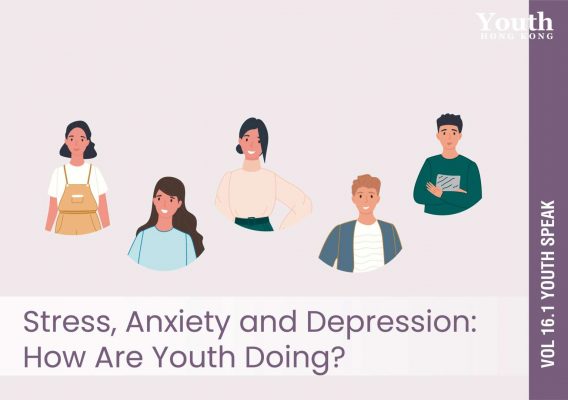//vol.16-1 Youth Speak
Stress, Anxiety and Depression:
How Are Youth Doing?
Speaking with youth, we identified the primary sources of stress, anxiety, and depression as pressure, high expectations from both others and oneself, and family issues. But there are always ways to defuse negative emotions.
Hailey, 22
The most significant pressure I encountered was during the DSE exams in Form 6. To be honest, I didn’t have a specific strategy to cope with and address my stress during that time. Presently, the primary source of stress is my work. When things don’t go as planned, I often feel depressed, doubting my abilities and a lack of working skills. However, I constantly remind myself that I am still young, with the capacity to continue equipping myself.
There’s an expectation from both society and my family that, upon graduation, I should secure a job with a decent salary to sustain life. The constant comparisons in income among peers also makes me anxious, making me wonder whether my income is below average.
When faced with negative emotions, I turn to friends for a talk, do workouts, listen to music, or unwind at home with books, comics, or YouTube. I believe that it’s essential to cultivate hobbies and interests while exploring my passion and inner self.
Louis, 29
I feel stressed when I don’t meet my goals and expectations as I planned. There are gloomy moments during rainy days or bad weather, but it is easy to move on when I concentrate on myself and engage in activities that bring joy.
I recommend immersing yourself in music, taking a refreshing shower, playing basketball, and enjoying some delightful drinks and dinner. If you possess sufficient confidence and inner strength, external pressures like societal expectations, peer influence, or family issues won’t have a significant impact on you.
Tommas, 28
The most stressful period for me was when I first started working. When I finally received my first paycheck, I looked at the figure, realising that all the stress that I’ve been through might not be worth the stress, so I decided to let go.
Family sometimes brings pressure. I told myself not to pay too much attention to them. Everyone has their own life and choices, and I don’t need to be responsible for other people’s decisions.
When I’m feeling down, I try not to force myself to be happy. I allow myself to feel the emotions, knowing that they come and go naturally. It’s important not to suppress bad moods but to learn how to coexist with them.
Jenny, 22
Often, my stress comes from family stuff – those minor quarrels and tensions at home can disrupt my focus at work. Occasionally, the added pressure of managing school deadlines while confined to home compounds the stress.
To navigate negative emotions, I typically shake things up and concentrate on self-care. Whether it’s a visit to the library, some solitary downtime, or a brisk walk in the park to stay active. Amidst the era of social media saturation, I make a conscious effort to direct my attention to people and things that truly hold significance for me.
A-yin, 20
I frequently find myself easily worrying and feeling tense about minor matters, whether they’re related to academics or other tasks. As a nursing student, the academic demands are high, and the associated stress is significant. Even with diligent preparation, it always feels like time is insufficient.
Unlike others, I’ve always had a small circle of friends since childhood. There was a period when a social worker showed concern for me, and things improved somewhat. However, recently, many familiar faces have left Hong Kong, and during that time, I often find myself in tears every night. It feels like I have to restart my life from childhood. My life swings between overwhelming busyness and idle moments where I overthink things, ultimately ending up in tears.
However, I find talking to supportive people or doing small crafts helps ease the stress. The hands-on process of making things gives me a sense of accomplishment.
Marco, 28
My negative emotions come when I’m alone by myself with no one to speak to. Last year, I went to Fukuoka, Japan by myself and didn’t talk to anyone during my one-week stay there due to language barriers. When I came back to Hong Kong, I felt so down and lost the ability to socialise and talk to people. Luckily, things got better a few days later.
My way of dealing with depression and unhappiness is by eating sushi and playing the piano. I feel I’m transported to another world by immersing myself in music and leaving behind all my worries. It is okay to feel sad but try not to overthink and exaggerate the unhappy part of life.
Rosaline, 21
In secondary school, I chose subjects based on my parents’ expectations, studying subjects I had no interest in. Throughout that year, we constantly argued, and eventually, when I was in Form 6, I attempted to run away from home. I stayed at a youth hostel for a few weeks, and finally, with my perseverance, I successfully changed my subjects.
The main source of my stress was my parents and my own high expectations. My parents often believed that only certain professions were decent, and anything else was considered of low value. They consistently thought their choices were the best. Due to the difference in viewpoints and a desire to avoid conflict, my solution was to minimise face-to-face communication with my parents.
In my earlier high school years, I suspected I had depression. I would cry in situations where nothing had happened, I would suddenly recall certain events, cry, and then struggle to sleep. I even contemplated suicide. Fortunately, many friends were with me, listened to my grievances and encouraged me.
When dealing with negative emotions, I believe it’s essential not to keep things inside when something happens. As I grew older, I discovered that many people are willing to accept and help me. This made me feel extremely relieved, even though the problem might not be solved, at least my soul found comfort. It gave me the courage to persevere and stand firm.


